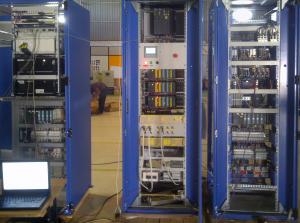Where cold and warm worlds meet
The enormous ITER superconducting magnets will operate at only four degrees above absolute zero and will be powered by converters located in buildings outside the Tokamak Complex. The connection of these cold magnets to the room-temperature electrical busbars is implemented through a unique series of components where the cold and warm worlds meet—the high temperature superconducting current leads.
The prototypes of these leads will be cooled down and powered for the first time at the ASIPP Institute in Hefei, China during the second half of 2014. The ITER Magnet and Control System Divisions have worked together for the last two years on the design and construction of the instrumentation, control, and interlock systems that will be necessary to safely perform these tests.
This joint effort reached its first milestone last December when the Factory Acceptance Test of the control system for the lead tests was successfully completed on the premises of Tata Consulting Services (TCS) in Pune, India. Staff from ITER as well as Indian engineers from TCS and Chinese scientists from ASIPP have worked last year to get the control system ready for delivery on time.
These tests represent an important milestone not only for our colleagues in the Magnet Division but also for the CODAC and interlock teams at the ITER Organization. The design of this control system is fully based on the hardware and software solutions developed by these teams during the last years and the tests are a very useful opportunity to prove their performance and identify any potential improvements. Last but not least, this project has shown how two ITER Divisions in two different Directorates can make a success out of a common endeavour.
The cubicles shown above were packed in Mumbai for a flight to China in the coming days, where they will be commissioned and finally connected to the equipment under testing conditions.


